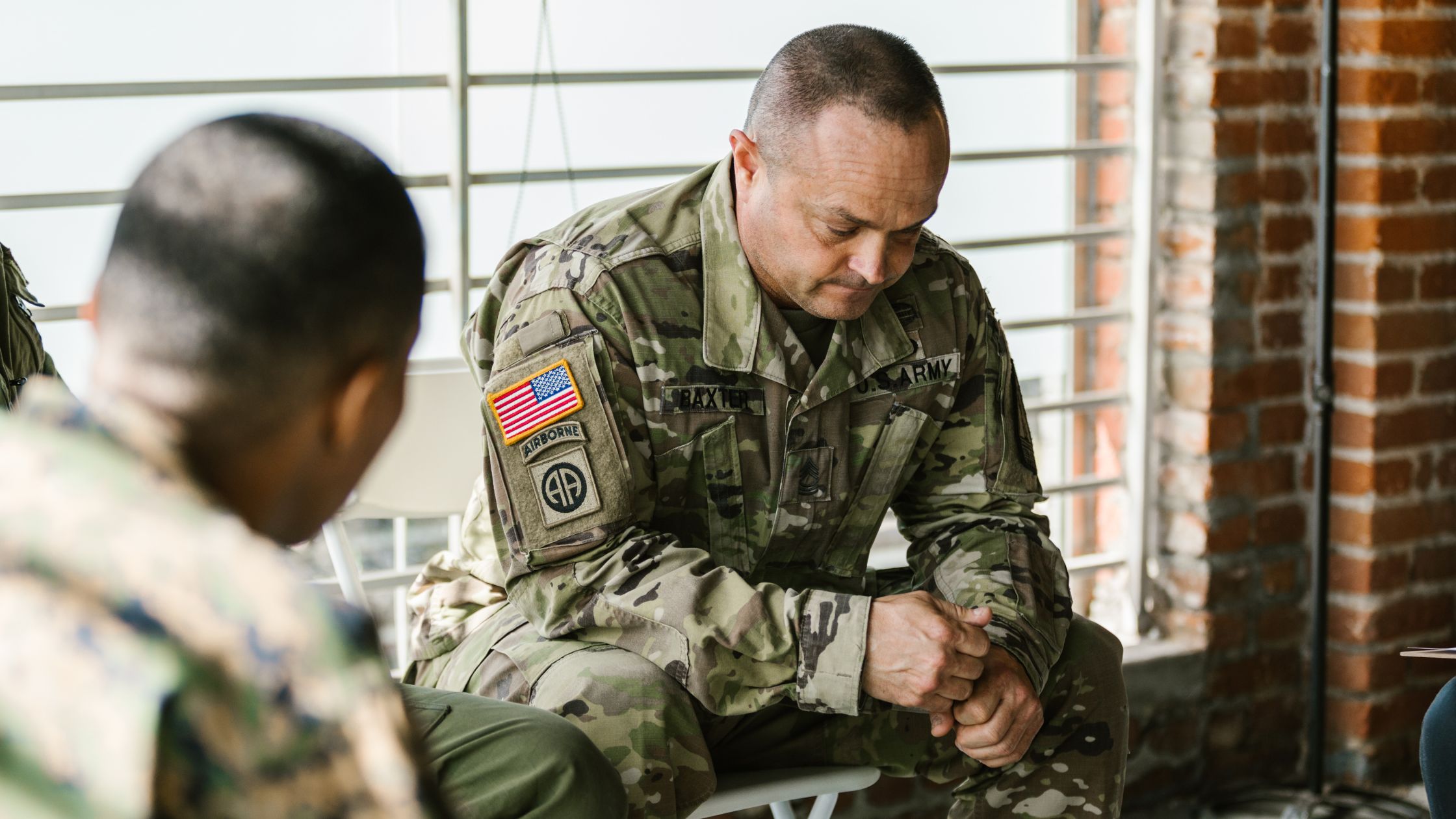
If you’re a veteran living with anxiety, you’re far from alone. The weight of service—whether it came from combat, training, long deployments, or the stress of military culture—can leave lasting emotional impacts that continue long after your discharge. Anxiety isn’t just about feeling nervous now and then. It can interfere with your sleep, make it hard to focus, cause irritability, or even trigger panic attacks that stop you in your tracks. For many veterans, these symptoms make it difficult to maintain employment, manage relationships, or enjoy everyday life. This is why you deserve your VA disability benefits for anxiety.
The good news is that the VA recognizes anxiety disorders as valid mental health conditions eligible for disability compensation. But understanding how to apply—and how to prove your claim—is where it often gets tricky. At VMHA, we’ve supported countless veterans through this process, and in this guide, we’ll walk you through how to obtain VA disability benefits for anxiety, step-by-step. Because getting the help you need shouldn’t feel like a second battle.
Everyone experiences worry and fear from time to time. This is a normal emotional response to stress. For example, you might feel nervous before a big presentation or a difficult conversation. This is your brain’s natural “fight or flight” response, and it usually goes away once the stressful event has passed.
Anxiety becomes a disorder when it is excessive, persistent, and starts to interfere with your daily life. Unlike normal worry, anxiety disorders involve a constant state of inner turmoil and dread, even when there is no real threat. Symptoms can include a rapid heartbeat, a constant feeling of being on edge, an inability to relax, and physical symptoms like headaches or muscle tension. If these feelings last for months or even years, they may be a sign of an anxiety disorder.
It’s common for veterans to have more than one mental health condition at the same time. Anxiety is often deeply connected to other conditions, such as PTSD and depression.
When you file a mental health claim, the VA will only provide one disability rating for your mental health. This means that if you have been diagnosed with both PTSD and depression, the VA will evaluate the symptoms from both conditions and give you a single rating that reflects the total impact on your life.
The VA includes several types of anxiety disorders under its mental health disability umbrella. Common conditions include generalized anxiety disorder (GAD), panic disorder, and anxiety that develops as a result of another service-connected condition, like chronic pain. These diagnoses may present with symptoms like chronic worry, intense fear, agitation, difficulty concentrating, trouble sleeping, muscle tension, or avoiding social situations altogether.
To qualify for disability benefits, your anxiety must be service-connected. This means that it either began during your time in the military, was caused by your service, or was worsened because of it. Importantly, you’ll need a formal diagnosis from a licensed medical professional to even begin your claim. The VA doesn’t base compensation on self-reported symptoms alone—your medical records and professional evaluations matter.
Strong evidence is the foundation of any successful anxiety VA claim, and that starts with collecting the right documentation. First, gather all medical records that support your anxiety diagnosis and treatment history. These can come from VA hospitals, civilian providers, or both. If you received mental health support during service, your Service Treatment Records (STRs) may contain critical references to anxiety, stress, or related symptoms.
You’ll also want to write a personal statement—in your own words—about how anxiety affects your daily life. Be honest. How does it affect your work? Your sleep? Your ability to leave the house or talk to people? This kind of narrative helps paint a fuller picture.
In addition, consider including “buddy statements” from people who know you—family, friends, or fellow service members—who’ve seen the impact anxiety has had on you firsthand. These third-party perspectives can make your case even more compelling.
Establishing a service connection is one of the most crucial steps in any VA disability claim. There are several ways this can happen. A direct service connection means your anxiety started while you were on active duty, or was directly caused by something that happened during your service, like a traumatic incident, constant exposure to high-stress situations, or harassment.
You can also establish a secondary service connection, where your anxiety developed as a result of another service-connected condition. For example, if you already receive benefits for chronic pain or a physical disability that has significantly impacted your life, and that stress has led to anxiety, you may be eligible to connect those conditions.
Finally, if you had anxiety before joining the military and it got significantly worse due to your service, that could qualify as aggravation of a pre-existing condition. In all cases, a nexus letter—a written statement from a licensed medical professional linking your anxiety to your service—is often the key to proving this connection and helping you secure your VA disability benefits for anxiety.
A well-written Independent Medical Opinion (IMO) from a qualified mental health professional can explain how your anxiety is connected with your service. VMHA specializes in providing this type of evaluation.
You can file your VA claim in several ways: online through VA.gov, by mail, or with the help of a Veterans Service Organization (VSO). The standard form used is VA Form 21-526EZ, and it’s important to fill this out carefully.
When describing your symptoms, be specific. Talk about how anxiety affects your job, relationships, and quality of life. Explain the severity and frequency of your symptoms—are they constant or do they come in waves? How do they impact your daily routine? Details like these help the VA assign an appropriate disability rating.
When describing your symptoms, be specific. The VA’s rating system is based on the severity of your symptoms and how they impact your occupational and social life. Generic statements like “I feel anxious all the time” are not enough.
Instead, paint a clear picture for the VA. Talk about how anxiety affects your job, relationships, and quality of life. For example, if your anxiety keeps you from leaving the house, explain that. If you’re having panic attacks multiple times a week, say that clearly. This isn’t a time to “suck it up” or pretend things are better than they are. The examiner needs to understand what your life is actually like.
Strong evidence for a claim includes:
After your claim is submitted, the VA may schedule a Compensation and Pension (C&P) exam, though you may be exempt from this if you have a credible IMO. This is an in-person (or sometimes virtual) medical evaluation where a VA-affiliated clinician assesses your mental health and how your symptoms affect your functioning.
This step can feel intimidating, but it’s important to be completely honest. Don’t minimize your symptoms. If you’re having panic attacks multiple times a week, say that. If your anxiety keeps you from working or even leaving your house, explain that clearly. This isn’t a time to “suck it up” or pretend things are better than they are. The examiner needs to understand what your life is actually like.
The VA uses its rating schedule to assign a disability percentage for your mental health condition. This rating can range from 0% to 100%, and it directly affects your monthly compensation.
If your claim is denied or underrated, don’t give up. You have the right to appeal through a Supplemental Claim, Higher-Level Review, or a Board Appeal.
Many veterans have service-connected physical disabilities, such as chronic back pain, a traumatic brain injury (TBI), or a mobility-limiting condition. Living with constant pain and physical limitations can take a serious toll on your mental health, leading to anxiety or depression.
You can file for a secondary service connection for your anxiety. To do this, you need a medical opinion that clearly states your anxiety is “at least as likely as not” caused by or worsened by your service-connected physical condition. This requires a professional who understands the link between physical and mental health. This type of claim is often very successful when supported by the right medical evidence.
Many veterans hesitate to file a claim for anxiety. They might think their symptoms are not “bad enough” or that they don’t deserve the benefits. This is a myth. If your anxiety, depression, or PTSD is affecting your life, it is serious enough to file a claim.
If your anxiety is making it hard to maintain a job, enjoy time with your family, or simply relax, you should consider filing. The VA benefits you could receive can provide the financial security you need to focus on your recovery and well-being.
There are a few key pitfalls that can trip up even legitimate claims for VA disability anxiety benefits. One is not submitting enough medical evidence, especially a nexus letter that ties your anxiety to your military service. Another is downplaying symptoms during the C&P exam—which is understandable but can hurt your rating. Other common issues include submitting incomplete paperwork, missing deadlines, or trying to navigate the process alone when professional help could make a huge difference.
If you want to give your claim the strongest possible foundation, stay active in treatment. Regular therapy or medication shows the VA that your condition is ongoing and being taken seriously. Keep a symptom journal to track how anxiety shows up in your life over time. This can also help you articulate your experience during the C&P exam. Most importantly, consider working with professionals who understand the VA system—like our team at VMHA.
We specialize in supporting veterans through the often overwhelming VA disability process—especially for mental health conditions like anxiety. Our licensed clinicians provide Independent Medical Opinions (IMOs) that include nexus statements, specifically crafted to meet VA standards.
We don’t just fill out forms—we take time to understand your history, your symptoms, and your story. Our evaluations are designed to support your claim with clarity, professionalism, and the level of detail the VA expects.
You’ve already done the hard part—serving your country. Let us help you secure the benefits you’ve earned. Visit our website to learn more about how we can assist you on your journey toward healing and financial relief. You don’t have to go through this alone.
Ready to take the next step? Contact us today to learn how our Independent Medical Opinions can help you receive your VA disability benefits for anxiety.
Email us at info@vmhaforvets.com or call us at 214-307-2198.

